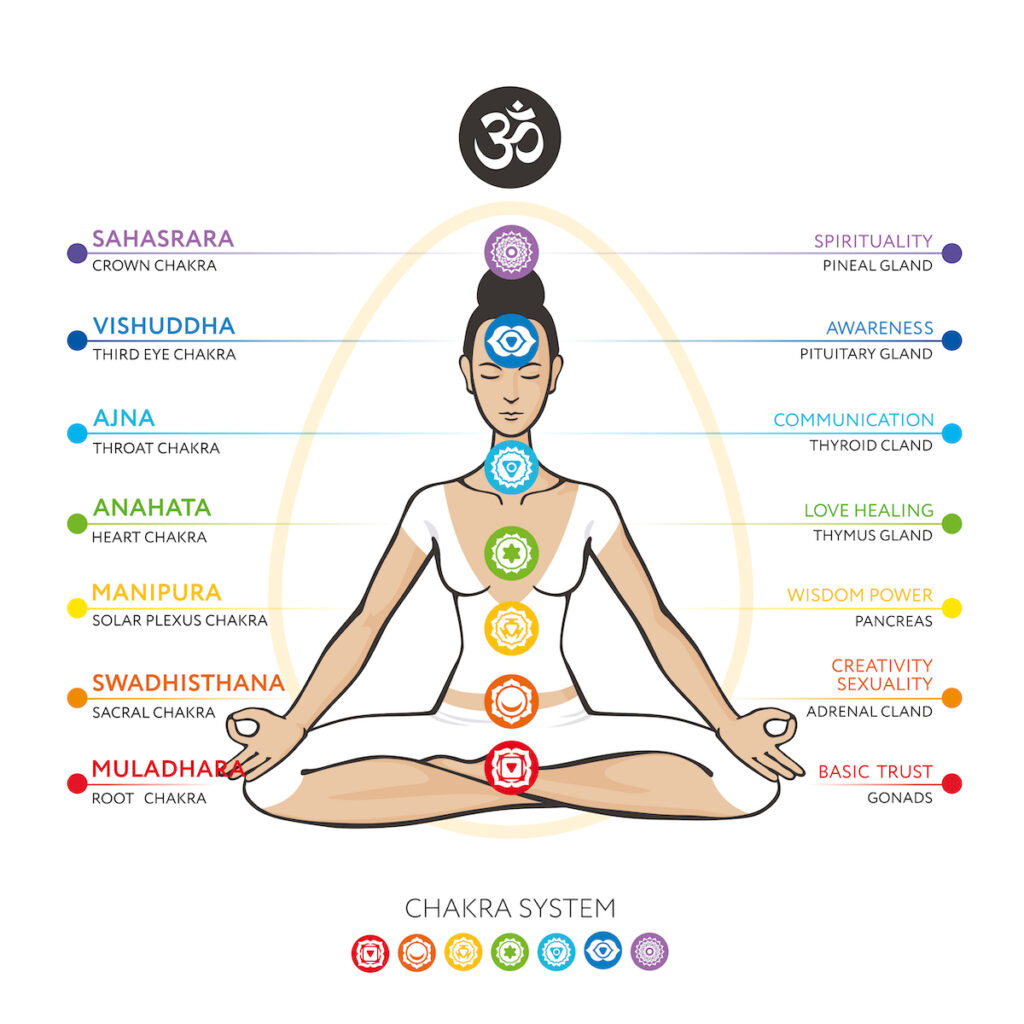I have a set of nine crystal bowls that I use to heal the mind, body and soul. My endocrine set is made up of a five-tone “pentatonic” scale, that includes bowls with the notes of: C#, D#, F#, G#, and A#. Each of the endocrine glands are aligned with different chakras. Below is a detailed description of the nine major endocrine glands, the chakras, and how I use the bowls to help bring balance and harmony.

When your body is out of balance, diseases can result. That is, illness is caused by blockage which stops the organ in question from vibrating at its healthy frequency. Sound healing works by sending sound waves throughout your body, which brings harmony through oscillation and resonance. This helps restore your body’s balance which in turn helps you heal.
A little science lesson–the endocrine system turns energy into chemistry through the release and management of hormones. It plays an important role in the management and regulation of bodily functions, specifically in keeping the body balanced and in a state of homeostasis. Just as the nervous system uses neurotransmitters and nerve impulses to send messages throughout the body, the endocrine system uses hormones as chemical messengers. The endocrine system is essential in regulating and facilitating:
- Homeostasis (the internal balance of body systems)
- Response to stimuli (stress and/or injury)
- Sleep function
- Growth and development of the body
- Metabolism (body energy levels)
- Reproduction
Hormones are the chemical messengers secreted by endocrine glands that tell organs and tissues what to do. Some hormones that are important to be aware of are:
- The stress hormones adrenaline, aldosterone, and cortisol can increase blood pressure and heart rate, and amplify metabolism
- Oxytocin, dopamine, and serotonin are the mood regulating hormones
- Estrogen, progesterone, and testosterone are the reproductive hormones
- Metabolic hormones include insulin, glucagon, and thyroid hormone.
- Melatonin, an essential hormone for sleep function
The Sexual Glands
These glands are associated with the root and sacral Chakras and the Note C #. For the male, this gland is the testes. Testosterone affects sex drive and muscle strength. In the female, it is the ovaries, which are responsible for regulating ovulation, placenta formation and milk production.

Pancreas
The pancreas is associated with the sacral and solar plexus chakras and tuned to the note D#. This gland is about 6 inches long and is located in the abdomen, behind the stomach. Playing a significant role in the digestive system, the pancreas is responsible for producing insulin and glycogen. These hormones balance glucose levels and help to control carbohydrate, fat, and protein metabolism.

Adrenal Glands
The adrenal glands are associated with both the sacral and solar plexus chakras and the note D#. Located on top of each kidney, these glands regulate metabolism, blood pressure, sexual development, and stress response. They produce cortisol, aldosterone, adrenaline, and DHEA. Cortisol is the major controller of carbohydrate metabolism and helps the body respond to stress and illness. Adrenaline is the hormone that is responsible for triggering “fight or flight”.
Thymus
Associated with the heart and throat chakras, and the note F#, the thymus gland is located near the heart, behind the breastbone. It is also considered part of the lymphatic system and is involved in maturing the white blood cells that help support the immune system in fighting illness.

Thyroid
The thyroid is a butterfly-shaped gland located in the front of the neck/throat area. It is associated with the third eye chakra and the note G#. It regulates the metabolism and also plays a major role in growth of the body and development of the nervous system. An imbalance in the thyroid hormone can lead to significant effects on the body:
- Low Thyroid (hypo) can lead to thickening of the skin, lethargy, obesity, and heart failure.
- High Thyroid (hyper) can lead to nervousness, anxiety, excessive weight loss, and heart palpitations. This can also affect depression and lead to menstrual abnormalities.

Parathyroid
The parathyroid gland is actually four tiny glands each about the size of a grain of rice. These glands, which are located in the throat behind the thyroid, are aligned with the throat and third eye chakras, to the note of G#. They control calcium levels in the body, which is essential for healthy functioning of the bones, heart, kidneys, and nervous system.
Pituitary
Associated with the third eye and crown chakras and the note A#, this pea sized gland is located in the brain. It is very important as it is often referred to as the “Master Gland.” It produces hormones that regulate levels of the sex and thyroid hormones and affect brain activity. The hormones created by this gland also affect hormone production of other glands, such as the thyroid, adrenals, and ovaries/testes. It has a significant influence on blood pressure, milk production, contraction of the uterus, ovulation, bone maturation and growth, protein synthesis, and the use of fat reserves.

Hypothalamus
This gland is located in the center of the brain and is largely responsible for controlling the endocrine system. Associated with the eye and crown chakras and the note A#, it connects the mind to the body. Its main function is to keep the body in a state of homeostasis. This gland takes information from the nervous system and relays it to the endocrine system in the form of hormones that trigger emotions, physical, and metabolic activity. The hypothalamus affects your body temperature, emotions/mood, hunger/thirst, sleep patterns, sex drive, metabolic functions, energy levels, and digestive function.
Pineal
The pineal gland is associated with the crown chakra and the note A#. Resembling the shape of a pinecone, this gland has a great deal to do with sleep function and circadian rhythms, regulating levels of melatonin.
















